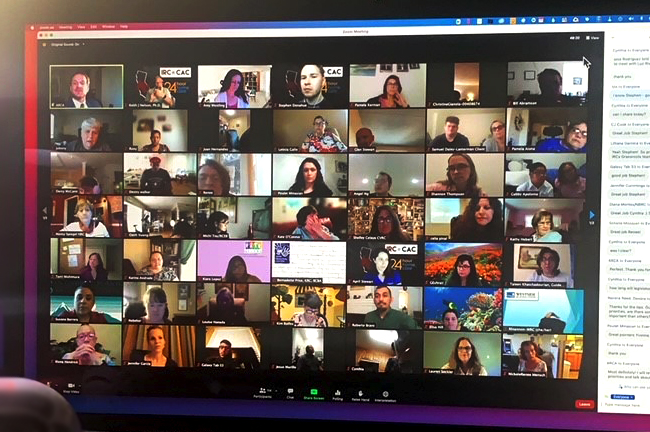The Association of Regional Center Agencies (ARCA) is an organization that represents the 21 regional centers across California. Their mission is to promote, support, and advance regional centers in providing community-based services to the over 350,000 people with developmental disabilities served. As part of its mission, ARCA organizes an annual Grassroots Day where regional center representatives have the opportunity to meet with state senators and assembly members to discuss barriers and issues pertaining to regional center services. Grassroots Day usually takes place at the Capitol in Sacramento, CA. This year, however, it was hosted virtually due to the ongoing pandemic. The virtual platform did not slow our team of IRC clients, staff, and service providers from advocating for our families. April Stewart, Regional Director of Strategy & Partnerships at 24 Hour Home Care, had this to say, “pressing forward with a virtual Grassroots Day during the pandemic is a great example of the headway we have made in breaking down silos to come together and impact real change in the quality and accessibility of services and supports. While I am proud of the progress we have made, there is still much work to be done to improve our service system including: addressing high caseload ratios, service provider rate sustainability, and accessibility to culturally competent services in all geographic areas.”
This year’s team met with 14 state senators and assembly members and was composed of Program Managers, CJ Cook and Jennifer Cummings, Cultural Specialist, Lilliana Garnica, client advocates, Stephen Donahue, Josh Pineda and Ismeth Estrada, parent advocate, Keith Nelson, Consumer Services Coordinators (CSC), Juan Castro-Granger and Adelita Gonzalez, and Regional Director, April Stewart, from 24 Hour Home Care. A diverse team such as this one, brings together a variety of different perspectives to the issues at hand. This group has first-hand knowledge of regional center impediments and client/family concerns. Among other things, Stephen Donahue, felt it was important to bring up the issue of transportation and how it impacts client involvement and independence. “I spoke about Uber and Lyft as options”, said Stephen, “but mentioned how costly it was dependent on distance traveled and the unknown factor of accessibility, also tossing in the fact that not all our clients are “tech savvy”. I touched on my personal experience dealing with transportation when first diagnosed with epilepsy and how a struggle that was living off of someone else’s schedule”.
This year, Adelita Gonzalez and Juan Castro-Granger had the opportunity to attend Grassroots Day and bring with them the CSC perspective. Lilliana had this to say about their contribution, “both CSCs spoke about the impact of high caseload ratios. They provided examples of how a particular family was impacted by the high caseloads that CSCs have and how a lower caseload could prevent certain shortfalls or scenarios from occurring. They also spoke about how lower caseloads could help them create personal and trusting relationships with their clients and families, which is pivotal to identifying client and family needs and challenges.” Over the years, caseload ratios have dramatically increased, currently 1:80 on average, putting an undue burden on CSCs and indirectly impacting our clients. “I hope the IRC team and I made an impact with the legislators we met with during Grassroots Day. Gained their support and efforts to help us get a general fund budget increase to help staff decrease caseloads for our consumer to receive the undivided attention they were promised and most importantly deserve.”, said Juan Castro-Granger.
CJ Cook provided the following breakdown of what was discussed and advocated for:
- Uniform “Holiday” Schedule and provider rate sunsets – The Governor’s Budget continues to propose a delay to the “Uniform Holiday Schedule” and extends recent service provider rate increases. Both outcomes are good but should be made permanent. The Uniform Holiday Schedule is a relic of the 2009 recession-era cuts. It is a furlough schedule, with 14 mandatory unpaid days forced upon providers, without regard to the impact on the people they serve. The provider rate increases are a step towards payment levels that match business realities but by once again making these changes temporary, permanent needs are treated as temporary adding uncertainty. We strongly support permanent solutions to permanent needs.
- Better minimum wage rate adjustments – Service providers often get rate increases when the state minimum wage goes up, this is not because the work they do warrants such a low payment level, it actually reflects a service system that hasn’t seen rate changes with increased business costs in many years. The process for making adjustments is burdensome and inequitable. Our system and the providers who help make its promises into reality deserve a more effective and efficient way to meet salary costs for their professional staff.
- Service coordination and caseloads – ARCA and SEIU-California are jointly requesting $55.0M (General Fund; $83.3M Total Fund) to meet statutory caseload requirements and the ability to better meet the needs of the individuals and families whom we serve. When service coordinators have too many cases, consumers and their families are not given the time and attention they need and have been promised. By bringing caseload levels down, people can get the time and attention needed to best meet their unique needs.
- AB 445 (Calderon) – ARCA is sponsoring AB 445, which would get rid of an old law that makes regional centers collect certain information from the parents of individuals getting regional center services. This is a barrier to service. Currently, regional centers have to get information, like Social Security numbers, from parents but if the parent doesn’t have a Social Security number or is concerned about sharing it for privacy reasons, they may just leave the center and not get services for their child. Centers do not need this information to start services. Getting rid of this requirement will not put any federal funding at risk or affect existing services, this will just make it easier for people who need regional center services to access them.
Check out this informational video created by ARCA explaining the basics on what regional centers are and how they support the life-long needs of individuals with developmental disabilities in California. This video was screened at the Grassroots Dinner.
YouTube: Developmental Disabilities and Regional Centers
If you would like more information about ARCA and the work they are doing, visit www.arcanet.org.
Share this Post




